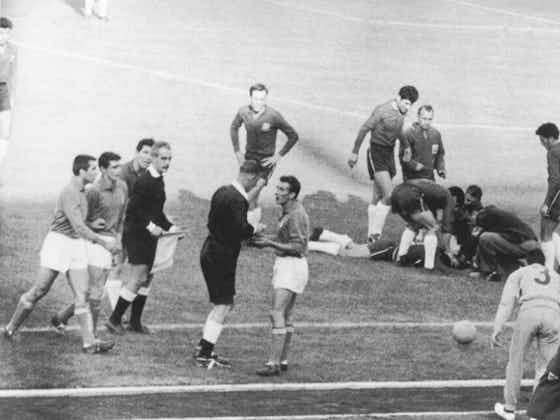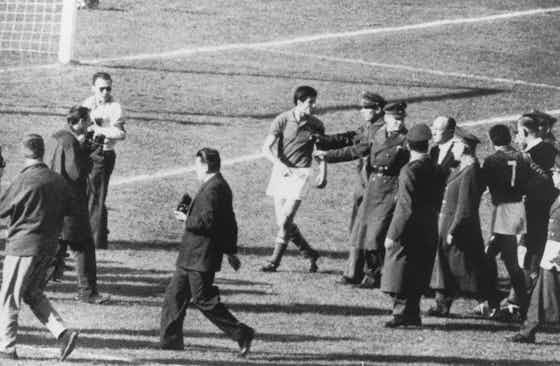OneFootball
Dan Burke·7 November 2022
🌎 Iconic World Cup Moments: Punches, sending offs and police intervention

In partnership with
Yahoo sportsOneFootball
Dan Burke·7 November 2022

In the build-up to this year’s World Cup, we will be bringing you an iconic moment from each of the previous tournaments. You can see all of the articles so far right here.
Today we’re taking a trip back to a crazy match in 1962.

Ken Aston should really be a household name for the impact he had on football, but the English former referee is more likely to be the answer to a pub quiz question: “Who invented yellow and red cards?”
The answer is of course Aston, and the yellow and red cards he invented while chair of the Fifa Referees’ Committee were first used at the 1970 World Cup in Mexico. It’s difficult to imagine the game without them.
However, it was a match Aston refereed eight years previously which must have given him the first germination of an idea.
The 1962 World Cup was held in Chile just two years after the South American nation had quite literally been rocked by the Valdivia earthquake – the strongest earthquake ever recorded in human history.
Organisational issues caused by the earthquake meant Fifa’s decision to award the tournament to Chile was a controversial one, and ahead of a group stage match between the host nation and Italy, one Italian newspaper went so far as to call it “pure madness”.
The fire was stoked even further when, in the build-up to the match, two Italian journalists penned a scathing attack on Chile’s capital Santiago, describing it as a backwater dump where “the phones don’t work, taxis are as rare as faithful husbands, a cable to Europe costs an arm and a leg and a letter takes five days to turn up”.
Chile’s press fired back, describing Italians in general as fascists, mafiosos, oversexed, and, because some of Inter Milan’s players had recently been involved in a doping scandal, drug addicts. Talk about a war of words.

On 2 June 1962, Chile “welcomed” Italy to Santiago’s Estadio Nacional, and poor Ken Aston was the referee tasked with trying to maintain order as the pre-match bad blood spilled onto the pitch.
The first foul occurred after just 12 seconds, and Aston had to send Italy’s Giorgio Ferrini off in the eighth minute for a foul on Honorino Landa. But red cards hadn’t yet been invented remember, and when Ferrini refused to leave the field, police officers had to come on and drag him off.
That sending off only made matters worse, however. Chilean outside-left Leonel Sánchez soon threw a left-hook punch at Italian right-back Mario David, and when Aston failed to punish the indiscretion, David retaliated with a kick to Sánchez’s head, which earned him a sending off.
A violent scuffle broke out in which Sánchez broke Humberto Maschio’s nose, but still the Chilean somehow wasn’t sent off. Perhaps Aston feared upsetting the home crowd, and the police had to intervene three more times before Chile eventually won the match 2-0.

When highlights of the match were shown on British television, BBC commentator David Coleman described it as: “the most stupid, appalling, disgusting and disgraceful exhibition of football, possibly in the history of the game.”
Chile made it all the way to the semi-finals that year, where they were beaten 4-2 by eventual champions Brazil, and Aston never refereed a World Cup match again.
How he could have done with some yellow and red cards that day, although it likely wouldn’t have made much difference in a match which infamously came to be known as the Battle of Santiago.






























































